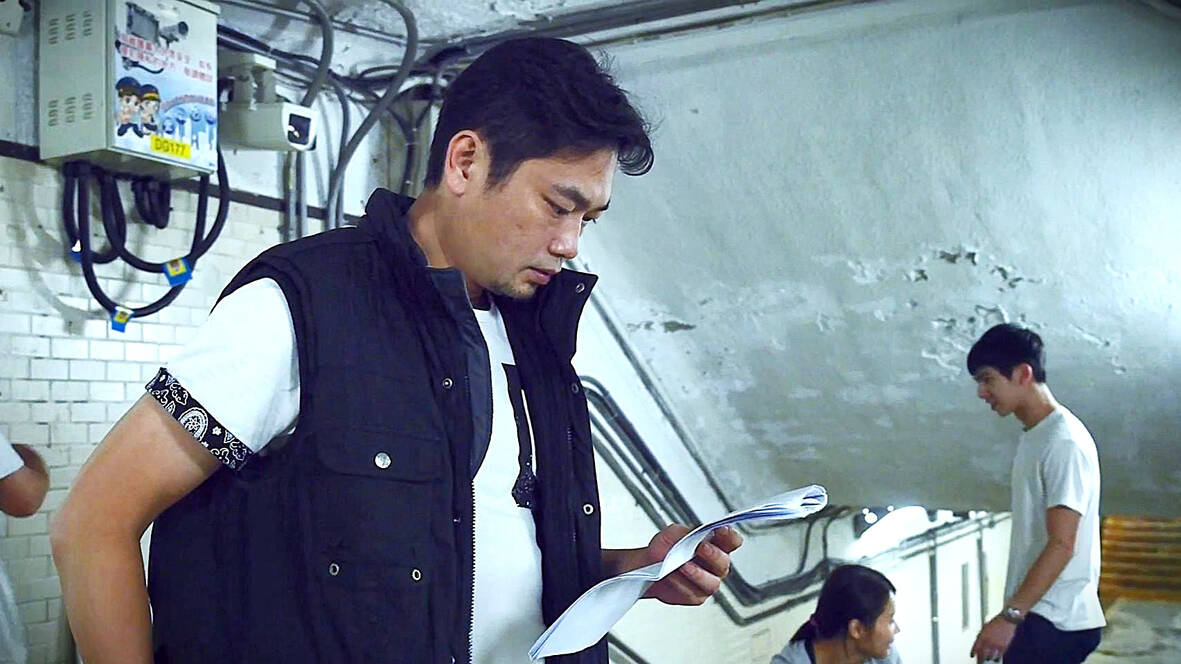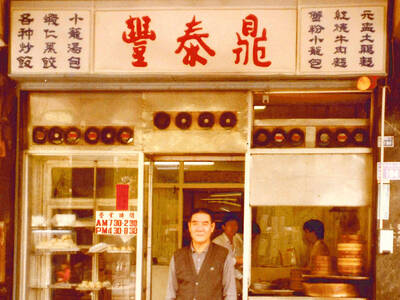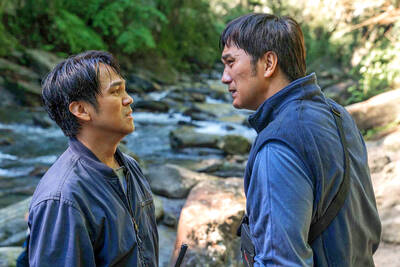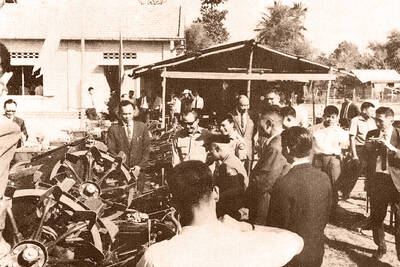This deep dive into the lives of professional movie extras starts out on a hilarious note, but the harshness of their lives soon sets in, and hits hard. Yet, the tone remains lighthearted and even upbeat due to the subjects’ relentless positivity, humor and self-deprecating nature, saving this documentary from falling into gloom and frustration.
The Extra’s Journey (臨演人生) spotlights three aspiring actors in Taipei who have been playing bit roles and background characters for years without being able to land any significant parts. Chang Ke-han (張可韓) is a martial arts enthusiast who hopes to become a an action star in China; Tsai Meng-chieh (蔡孟婕), a transplant from Kaohsiung, takes on many gigs, from facial wash commercials to roadside vendors, and Shih Sheng-lung (石聖龍) leaves his wife and teenage son in Taichung and drives an Uber to support the family when he’s not acting.
Their struggles are exacerbated by the 2016 film industry recession and COVID-19 pandemic, which happened during the seven years of filming by director Wu Hsin-yu (伍心瑜). The movie sheds light on these meagerly-paid workers, who may have appeared in your favorite movie or drama but received no recognition. It won Wu best feature at the 2022 Taiwan International Labor Film Festival.

Photo courtesy of La Su Shi Film Studio
The relentless pursuit of one’s dreams against all odds is a favorite subject in Taiwanese media, but directors often end up delivering a cliched message that’s just not relatable to most viewers. Granted, it’s hard to sugarcoat a situation where one has trouble landing even minor roles and relies on doing temp jobs just to survive on NT$200 a day. Even when they make it onto the set, they often sit there all day without being called on for any work. But this intimate, honest glimpse of their daily lives and inner thoughts is uplifting in its own way.
It helps that the subjects are often hilarious with their one-liners and musings; the situations and odd tasks they find themselves involved in are also quite absurd. Wu manages to capture countless spontaneous moments and candid interactions just at the right time, keeping the mood light and engaging.
While the three actors don’t stand out that much, they genuinely enjoy what they do and strive to better themselves. Despite their struggles, which they are frank about, they remain cheerful and upbeat, still hoping to one day land that one significant role. This is what makes them so relatable and their quests admirable. A movie cannot be made without them, and does one really have to achieve “success” to make their efforts meaningful?

Photo courtesy of La Su Shi Film Studio
Wu devotes significant screen time to the subjects’ families to help round out their stories. The three have drastically different relationships with their loved ones, who vary in their level of support, and one can see how that also contributes to their character and motivations.
As mentioned earlier, most of the funny scenes are in the first part of the movie, while the latter half is more serious and emotional. This treatment helps the audience ease into the movie and get an immediate feel for the subjects’ personalities. By the end, however, it feels uneven.
Wu, whose previous works featured youths who just got out of prison and indigenous women rebuilding their lives after Typhoon Morakot devastated their homeland, continues her exploration of those who often go unnoticed in society. She came across the topic of extras when she met Chang during casting for another project, and became interested in what their work and private lives were about.

Photo courtesy of La Su Shi Film Studio
“My original intention was just for people to pay attention to these extras,” she said at the Taipei premiere on Wednesday last week. “I hope to shift the spotlight away from the main characters.”

March 24 to March 30 When Yang Bing-yi (楊秉彝) needed a name for his new cooking oil shop in 1958, he first thought of honoring his previous employer, Heng Tai Fung (恆泰豐). The owner, Wang Yi-fu (王伊夫), had taken care of him over the previous 10 years, shortly after the native of Shanxi Province arrived in Taiwan in 1948 as a penniless 21 year old. His oil supplier was called Din Mei (鼎美), so he simply combined the names. Over the next decade, Yang and his wife Lai Pen-mei (賴盆妹) built up a booming business delivering oil to shops and

Indigenous Truku doctor Yuci (Bokeh Kosang), who resents his father for forcing him to learn their traditional way of life, clashes head to head in this film with his younger brother Siring (Umin Boya), who just wants to live off the land like his ancestors did. Hunter Brothers (獵人兄弟) opens with Yuci as the man of the hour as the village celebrates him getting into medical school, but then his father (Nolay Piho) wakes the brothers up in the middle of the night to go hunting. Siring is eager, but Yuci isn’t. Their mother (Ibix Buyang) begs her husband to let

In late December 1959, Taiwan dispatched a technical mission to the Republic of Vietnam. Comprising agriculturalists and fisheries experts, the team represented Taiwan’s foray into official development assistance (ODA), marking its transition from recipient to donor nation. For more than a decade prior — and indeed, far longer during Chinese Nationalist Party (KMT) rule on the “mainland” — the Republic of China (ROC) had received ODA from the US, through agencies such as the International Cooperation Administration, a predecessor to the United States Agency for International Development (USAID). More than a third of domestic investment came via such sources between 1951

The Taipei Times last week reported that the Control Yuan said it had been “left with no choice” but to ask the Constitutional Court to rule on the constitutionality of the central government budget, which left it without a budget. Lost in the outrage over the cuts to defense and to the Constitutional Court were the cuts to the Control Yuan, whose operating budget was slashed by 96 percent. It is unable even to pay its utility bills, and in the press conference it convened on the issue, said that its department directors were paying out of pocket for gasoline